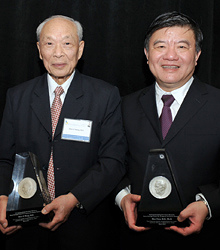|
 |
|
Wang Zhenyi (left) and Chen Zhu (XINHUA) |
Chinese scientists Wang Zhenyi and Chen Zhu were granted the Seventh Szent Gyorgyi Prize, a top U.S. award established by the U.S. National Foundation for Cancer Research, on March 6 for their innovative research that led to a new therapeutic approach to acute promyelocytic leukemia (APL).
Since the 1990s, the two scientists have worked together to conduct clinical trials combining all-trans retinoic acid (ATRA) and arsenic trioxide to treat APL patients. By combining traditional Chinese medicine with Western medicine, they have increased the survival rate of APL patients from approximately 25 percent to 95 percent during their "five-year disease-free" period. Their therapy is now a standard for APL treatment throughout the world and has turned one of the most fatal diseases into a highly curable one.
Wang, 88, graduated from the former Aurora University in Shanghai in 1948 with a doctoral degree. His specialties are hematology and the treatment of cancer. Wang is the first scientist to transform cancer cells into normal cells. In 1994, he was elected a member of the Chinese Academy of Engineering.
Chen, 58, Wang's former student, made major contributions to the identification of the molecular mechanisms of both ATRA and arsenic trioxide in APL. He was elected a member of the Chinese Academy of Sciences in 1995 and was its vice president from 2000 to 2007. Chen has been the minister of health since 2007. | 